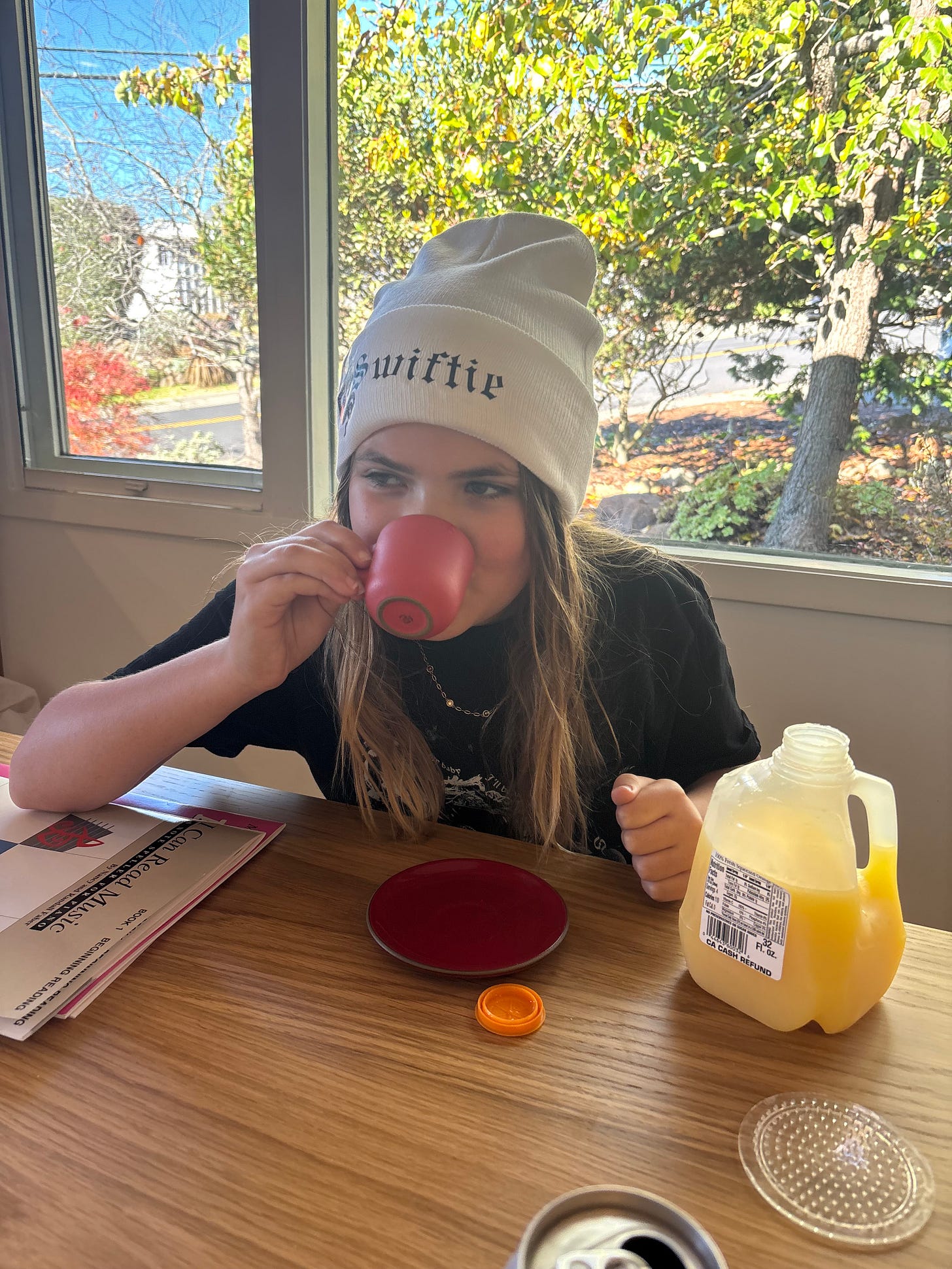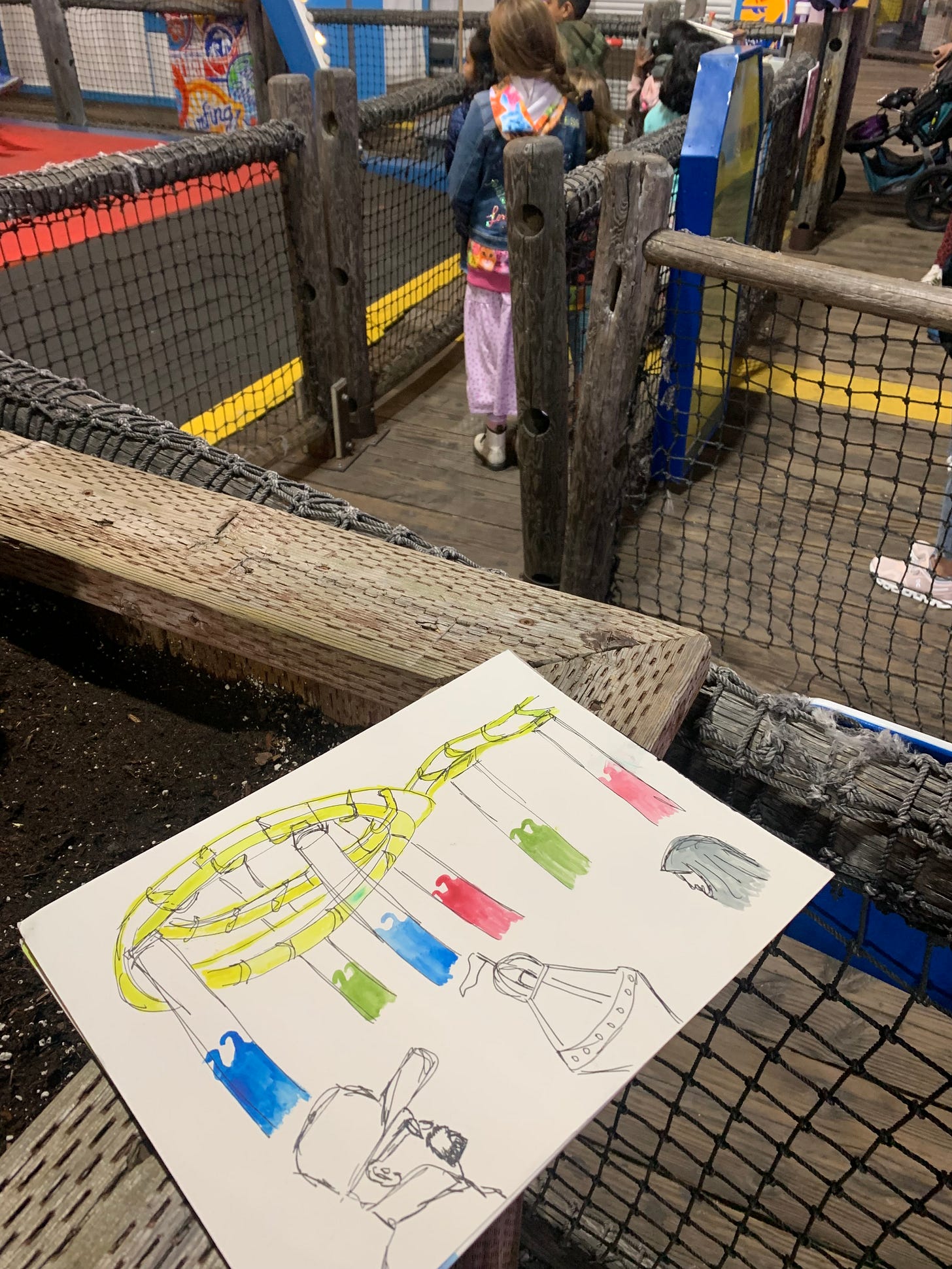Hey all, I’ve got a couple of podcast episodes out this week that might be nourishing for you…
Media mogul Arianna Huffington introduces me to her little sister Agapi Stassinopoulos, her “first spiritual teacher.” Take a listen. You'll be re-mothering yourself in no time:
We also have another episode of our podcast on narrative change out via , this time with the delightful and deep and . Learn how they infuse joy in their inspired collaborations on some of the country’s most dire issues:
And now on to the main event…
Morning works like this in our house: wake up and chit chat with Stella, my 8-year-old, about whatever thing is on her mind that day (recent topics include Anne Frank, sleep away camp, and Guinness Book of World Records). Be sure to get to my 11-year-old’s room by 7:30 to make sure she is awake. Cherish her sleepy face, which is exactly how she looked when she was a one-year-old. Toast bagels, spread cream cheese. Pour coffee. Clean out disgusting lunch box from day before. Pack lunch despite having told 11-year-old it is her responsibility. Marvel at her strange palette: she wants radishes, edamame, stinky cheeses and corn salsas (what happened to peanut butter and jelly?!). Brush out tangles and braid hair. Fill water bottles. Make sure girls are both actually wearing new clothes, not pajamas or the outfits they wore the day before. Yell “brush teeth!” Yell “It’s 8 o’clock!” as if that will actually, for the first time in recent history, motivate anyone to avoid the inevitable fight on the way out the door. Greet Dad in the kitchen; due to his advancing dementia, his top-of-day energy is typically bewildered and meek, like “Can someone tell me who I am and what the hell I’m doing here?” Give him a morning hug and ask how his sleep was. Make oatmeal for him: walnuts, cinnamon, maple syrup, flaky salt on top. This may be his second breakfast. That’s okay—he’s dying, let him have three breakfasts. Girls tumble out the door fighting with their dad, who is likely whistling. Door shuts. Check in with mom about the night’s sleep, the day’s care plan for my dad, the latest hilarious thing youngest granddaughter has said. Get to work. Hope for the best. Know the best probably won’t happen. It’s about 8:45am.
I keep describing the sandwich caretaking I’m doing right now as a rollercoaster ride. It’s the most accurate physical description I can muster for the emotional sensation of thinking I’m on solid ground one minute—like that moment the door shuts and I know I’ve got the girls out to school for the day—and the next—when I find out that there is a bathroom accident with my dad that requires clean-up, or he’s gone wandering too long and someone needs to get in the car and go look for him, or the refill that the doctor swears she called in isn’t showing up in CVS’s system. One moment, I’m feeling mildly capable, thinking—maybe I will chip away at my inbox today or pay that bill I’ve been neglecting or finally get to call my best friend—and the next I am in triage mode. I text my work collaborators and let them know I’ll be late to the zoom, or scrap the walk I was just about to take so I can tend to some administrative detail that will add up to emotional crisis for my parents if not resolved.
It feels like I roll up my sleeves—literally and emotionally—at least every other day around here. Coping, I guess it’s called, which I just looked up and learned has French origins meaning “come to blows.”
At first, that didn’t make sense to me. Come to blows? I’m not trying to fight anyone. I’m just trying to show up lovingly and effectively within the ever present crisis of advanced dementia in a multi-generational household.
But the more I think about it, the more I realize that when you are chronically coping, you are sort of “coming to blows” with reality over and over again. It’s like my brain, my heart, my body, my spirit—they’re collectively craving to rest inside of these moments of okayness. I get the girls off to school. I feel the accomplishment and peace of it, the promise of a quieter, less demanding house—Girls are okay. Dad is okay. Everyone is okay.—and then I “come to blows” with the reality of my dad’s failing body and mind and its radius of impact. My sense of okayness disintegrates in an unpredictable instant. In this way, my historically gentle and unassuming papa has become like a newborn baby—profoundly needy, disruptive, and totally unaware of his demanding influence on those around him.
Becoming a parent has prepared me well for this moment in many ways. When I had Maya, my now 11-year-old daughter, there was a period of time after her birth when I felt vigilant all the time. I just could not get my nervous system to believe in the okayness of the new arrangement. It felt terrible, but over time it subsided; I became a more confident mother, eventually touching into a new wisdom that I could return to when my anxiety flared. It’s okay now. It might not be okay. And that has to be okay.
That little triad has sort of become my mothering mantra. I made these beautiful babies and now they walk around in the world and, technically speaking, they are okay now. There are moments when they haven’t been okay and then they became okay again. There are moments in the future when they will not be okay—maybe even really, really not okay. And that has to be okay. This is the price of loving and caring for humans on earth—living alongside the truth that their okayness is not promised.
I need a new mantra for my dad, I suppose. Something related but different. Maybe: It’s okay in this moment. It will not be okay soon enough. Take good care of yourself so you are ready for the ride. When my dad sits and eats his morning oatmeal, he’s often okay. Even if he doesn’t remember that it’s called oatmeal, or that I made it for him, or that my name is Courtney—that’s okay. But then something happens and he’s not okay, and even if I try to pretend otherwise, I’m not okay.
And I can get through all that, as long as I’m also taking care of myself—moving my body and spending time in nature and among my loving, hilarious friends, writing and reading, snuggling my babies, watching teen dramas and cooking nourishing dinners and getting bear hugs from my big brother, doing work—even unpredictably—that makes me feel capable and inspired.
I long to be off the ride, to feel a sense of extended and liberating peace. But I also know that being on the ride is temporary and sacred, the only way to become the exact kind of warrior I am becoming. I’ve never felt so grounded even though I can’t possibly keep my feet on solid earth for long before the next crisis hits. The most intensive kind of caretaking is like this—joining yourself with someone you love, understanding that okayness is fleeting, coming to blows with reality over and over again, and developing the most divine muscles for living and dying and loving all the while.
Come to think of it, I think we are in a national and even global moment of not okayness, of riding the roller coaster, of “coming to blows” with reality. We are coping—some of us more gracefully than others—with a democratic system so vulnerable, as it turns out, to breaking down, so vulnerable to the whims of mega-rich men hungry for relevance, peddling some delusion that there is a utopian okayness available to us if we just burn it all down and start over.
What caretaking teaches us is that there is no grand or permanent utopia, only tiny, fleeting, and intimate ones—my dad’s smile upon hearing Bob Dillon’s voice pouring out of the speaker, my daughter’s comedic timing as she makes her depleted grandmother laugh, the majestic sunset. Caretaking also teaches us that no one, no culture, no system is a blank slate. Even our newborn babies come out with fully intact souls, as any parent will attest. And our elders, even as they ride that final descent, are not blank but beyond blankness; they are the return of the soul’s first shape, sometimes distorted by disease, but unmistakable nonetheless.
It’s okay in this moment. It will not be okay soon enough. Take good care of yourself so you are ready for the ride.
How are you coping in this personal and political moment? Do tell, dear readers.






I am a caretaker, primary or secondary, for two people of different ages who live with extreme disability. One fell ill ten years ago. The other is a young child. Both will outlive me by decades.
To many on the outside, both look like tragedies. They are not.
I have come over the years to define 'okay' for all of us, or better than okay, almost entirely in terms of how cheerful or positive they are.
Miraculously, they usually both are, and I feel blessed for it.
If and when one or the other goes through a spell of very much not being positive and cheerful, and a spell can be, I must admit, years long, I have to hold onto a different idea of okay that looks more like 'safe and working on the rest.'
We humans are made to play the cards we have been dealt. It is vital, I find, to have an eye for what is golden and wonderful even while facing realistically what is very much not and doing our part to make things better.
I love this Courtney. And I completely agree that what you and your family are experiencing is a microcosm of what so many of us in the US are experiencing right now. I'm struggling daily (hourly, minutely) to find my footing amidst the backdrop of such horrible, cruel, and destabilizing developments and the ups and downs of work, family, life, perimenopause and the like. My own substack is my attempt to find that balance between being a good human, defending democracy while doing the things to feed our bodies and souls so we can keep showing up. A work in progress for sure. Sending you a hug!